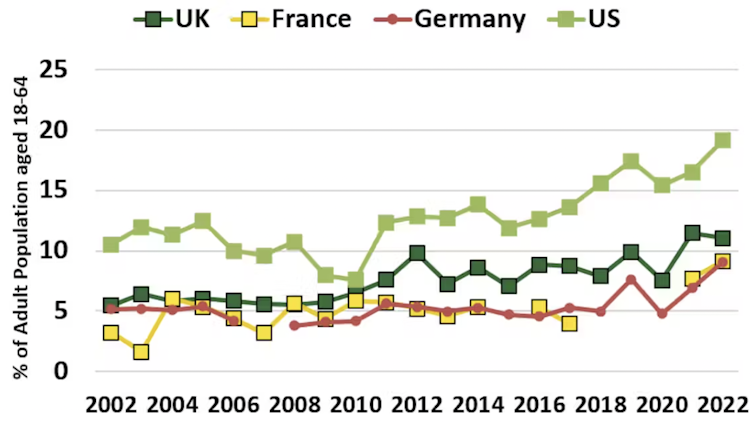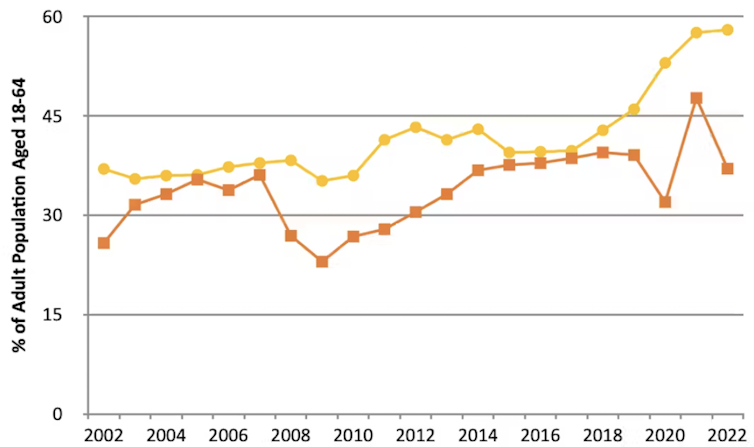The UK picked a bad year to have a political crisis in 2022. The markets were already jittery because the global economy was struggling to recover from COVID. The war in Ukraine drove up energy costs, leading to high inflation and a cost of living crisis in many developed economies. In the UK, these pressures had combined with the effects of Brexit to sharply raise the cost of doing business.
Then, in early July, Boris Johnson was forced to resign as prime minister, ushering Liz Truss into office. Her administration’s inaugural budget in September led to an economic shock as markets gave their judgement overnight. On the back of this, business confidence collapsed.
This was the backdrop to our annual Global Entrepreneurship Monitor 2022 (Gem) survey. We surveyed just over 10,000 people in the UK between June and late September (3,000 phone interviews and 7,000 web surveys). We found the UK was in the midst of an uncertain summer that made people less inclined to start businesses. The nation has duly lost ground in the entrepreneurial stakes to rival economies, though there are a few positives buried in the data as well.
The Johnson/Truss effect
By the time we had finished our first 2,000 phone interviews by late June 2022, 12.9% of respondents were in the early stages of starting businesses. Once we had concluded our fieldwork in September, the rate of entrepreneurship among all 10,000 respondents was 11%, suggesting it declined over the summer.
If we just compare the phone interview statistics to factor out any potential variations in how people answer the two types of survey, it’s even more compelling. The final 1,000 phone interviewees in the weeks after Johnson had resigned showed an entrepreneurship rate of just 7.4%. This is hardly surprising as the relentlessly negative headlines about the state of politics and the economy filtered through to people’s economic choices.
This self-inflicted wound by the party of government also means the country’s entrepreneurship trend diverged from the US, France and Germany. Those countries have all seen sharp increases in early-stage entrepreneurial activity following the pandemic. The UK experience paints a depressing picture of how easy it is to shake the confidence of potential entrepreneurs.
Adults setting up businesses by country, 2002-22 (%)

There is also evidence in our 2022 survey that adults are feeling less entrepreneurial in the UK than previously. The proportion of working-age adults not already running businesses who saw good opportunities for starting one fell year on year from 48% to 37%. In France, it remained the same at 52%, while Germany saw a drop of eight percentage points to 40%.
As the next graph shows, the UK’s fall in entrepreneurial spirit (orange line) is comparable to previous periods of economic uncertainty like the 2008 global financial crisis and the early months of the COVID pandemic in 2020. Coupled with this, the fear of failure among those who still see good business opportunities (yellow line) remains at an all-time high.
UK perceptions of business opportunities, 2002-22

More bad news and a couple of positives
Our survey has been measuring the entrepreneurial activity of working-age adults in a wide range of countries in a comparable way since 1999, making it one of the longest-standing efforts at tracking these trends globally. The Gem surveys began as a joint research project between Babson College in the US and London Business School in the UK. As many as 49 countries participated in the most recent survey, with national teams composed of different academic institutions leading the data-gathering in each country.
The UK’s ranking in the overall quality of its entrepreneurship ecosystem also fell to 25th in 2022 from 18th the year before. This is assessed based on a survey of 36 entrepreneurship experts on 13 parameters, such as financing and physical infrastructure. In nine out of the 13 parameters, the UK was downgraded in 2022.
There are several silver linings. The proportion of women in the UK starting up businesses compared to men was 78% in 2022, an increase of five percentage points from the previous year. In the context of the overall discontent, this rise suggests that female entrepreneurship is quite resilient in the UK. For comparison, the equivalent figure is 65% in France and Germany and 89% in the US.
We also observe a continuation in the long-term trend of entrepreneurial activity among immigrants in the UK (13.7%) being higher than that of life-long residents (8.7%). The same is true of entrepreneurial activity among the non-white population, which was 16.2% compared to 10.2% among white people.
Nonetheless, the political uncertainties in the UK clearly harmed business confidence and, in turn, entrepreneurial activity. The way to avoid this is to ensure that government policy does not change drastically between prime ministers. We also need UK business-support initiatives to continue, like the Help to Grow programme, Growth Hub network and Innovate UK.
As for the period since the end of our 2022 survey, the rate of entrepreneurial activity may well have further declined. This would make sense in view of the continuing cost of living crisis, with its combination of sticky inflation and rapid rises in interest rates. Until more people feel like starting businesses again, the downturn is probably grinding on – with an unhelpful push in the wrong direction from the government.
Mark Hart receives funding from the Department for Business and Trade; Welsh Government; Department for the Economy in Northern Ireland; NatWest Group to aid the collection of the GEM data each year but all views are his own. .
Sreevas Sahasranamam does not work for, consult, own shares in or receive funding from any company or organisation that would benefit from this article, and has disclosed no relevant affiliations beyond their academic appointment.
This article was originally published on The Conversation. Read the original article.







